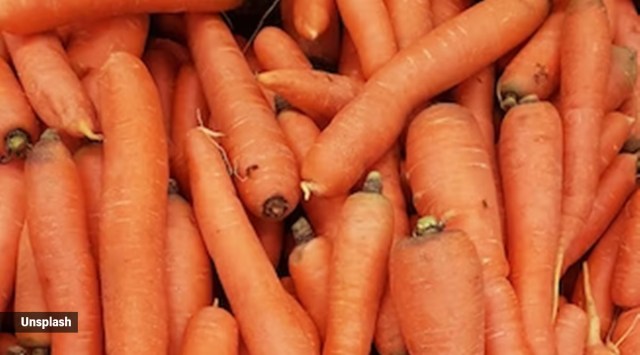📣 For more lifestyle news, click here to join our WhatsApp Channel and also follow us on Instagram
Nutrition alert: Here’s what a 100-gram serving of carrot contains
That raw carrots are more nutritious than cooked carrots is a common misconception, according to Vani Krishna, chief clinical nutritionist at Bangalore’s Manipal Hospital.
 Carrots are a great source of important vitamins and minerals. (Source: Unsplash)
Carrots are a great source of important vitamins and minerals. (Source: Unsplash) Carrots are a favourite of rabbits; it is time you also made the vegetable your favourite. Not just giving that satisfying crunch, carrots are also a powerhouse of macro- and micro-nutrients, according to Vani Krishna, chief clinical nutritionist at Manipal Hospital, Bangalore.
Krishna said that half a cup of them can provide you with a host of vitamins and minerals important for the body.
Let’s understand how beneficial carrots are for health and how we can incorporate them into our diets.
Nutritional profile of carrots
 Carrots are a great source of important vitamins and minerals. (Source: Unsplash)
Carrots are a great source of important vitamins and minerals. (Source: Unsplash)
According to Krishna, a 100-gram serving of carrots contains the following nutrients:
Energy- 33.22 Kcal
Carbohydrate- 5.55 g
Protein- 0.95 g
Fat- 0.47 g
Fibre- 4.18 g
Sodium- 52.33 mg
Potassium- 273 mg
Vitamin A- 73% of your daily required value (DV)
Vitamin K- 9% of DV
Potassium and fibre- 8% of DV
Vitamin C- 5% of DV
Calcium and iron- 2% of DV
Health benefits of carrots
Krishna explained that carrots are extremely beneficial when incorporated into our diets:
Antioxidant: Carrots are among the coloured vegetables and its carotenoids are potent antioxidants that neutralise the free radicals. The flavonoids and phenolic derivatives have many antioxidants.
Anti-carcinogenic: The vitamin A in carrots protects DNA from oxidative damage that can lead to cancer. The components like betacarotene and other carotenoids promote immunity and inhibit cancer cells. Carrots reduce the risk of prostate, lung and breast cancer in women.
Protects eyesight: Carrots are an excellent source of vitamin A, including the carotenoids lutein and zeaxanthin. Because these compounds tend to accumulate in the retina, they help in preventing age-related macular degeneration, a common cause of vision loss. Deficiency of vitamin A can lead to night blindness.
Helps in digestion: As the carrots are rich in fibre, it adds bulk to the stool. The fibre content of carrot is 4.18g in 100 g. Eating a high-fibre diet can help to prevent constipation and other digestive issues.
Can diabetics consume carrots?
 As the carrot contains fibre it improves glucose metabolism. (Source: Unsplash)
As the carrot contains fibre it improves glucose metabolism. (Source: Unsplash)
The glycaemic index rates food on a scale of 1-100, with 100 meaning that the spike in blood sugar levels is compared to pure sugar. According to the International glycaemic index table, Krishna explained that carrots have GI of 32 and GL (glycaemic load) of 3, if the serving size is kept under 1 cup /one serving.
“The glycaemic index will change based on the mode of cooking method,” she added.
People who have diabetes can consume the carrot in moderation, one cup of chopped carrot provides 15g of carbs, according to Krishna. “As the carrot contains fibre it improves glucose metabolism. Take carrot in the diet along with the other vegetables to reduce the carb in the food.”
She advised adding seasonings after cooking as adding salt while cooking likely increases the breakdown of the starch and results in an increased glycaemic index.
Is it beneficial for pregnant women?
Carrots are rich in beta carotene – precursor of Vitamin A, Krishna said, which “helps the growing foetus, mainly for the development of eyes, skin and immune system.”
As the carrots are rich in fibre, it helps to relieve constipation faced by pregnant mothers. “It helps to regulate blood sugar and may also contribute to feelings of satiety,” she said.
Krishna advised washing carrots thoroughly to remove the pesticides and dirt. “Cooking method can be steamed or boiled.”
Things to keep in mind while eating carrots
Though carrots are rich in nutrients, vitamins and fibre, over consumption of carrots can lead to production of excess beta-carotene, according to Krishna. “This can lead to yellow or orange discolouration in skin, a disorder called carotenemia. This should caution people who consume large quantities of carrot juice.”
Individuals who are allergic to parsley, celery and spices may experience an allergic reaction to carrot, Krishna said. “Swelling of lips, itching, eye and nose irritations are the major signs and symptoms of carrot allergy.”
Krishna suggested consuming less than 4 carrots per day.
Myths about carrots
A lot of people believe eating as many carrots as they can will be helpful but Krishna strongly advises against it. “According to studies, taking too much beta carotene can have adverse effects on the body, including an increased risk of lung cancer among smokers.”
Another myth surrounding carrot consumption is that it improve eyesight but that doesn’t mean you’re always eating carrots.
“It is critical to have enough vitamin A for healthy eyes. And this vitamin, which is really a combination of molecules made up of retinal (the active form of vitamin A) and carotenes like beta-carotene (which gives carrots their unique colour), is abundant and naturally found in foods like carrots. However, eating too many carrots and vitamin A won’t make your eyes healthy.”
The most common myth around carrot consumption is that raw carrots are more nutritious than cooked, but Krishna explained that carrots’ nutritional value is increased when cooked. “Carotenoids (antioxidants) increased by 14% when carrots were boiled, but decreased by 12% when carrots were cooked differently, particularly when they were fried.”
📣 For more lifestyle news, follow us on Instagram | Twitter | Facebook and don’t miss out on the latest updates!
📣 For more lifestyle news, click here to join our WhatsApp Channel and also follow us on Instagram





- 01
- 02
- 03
- 04
- 05






















